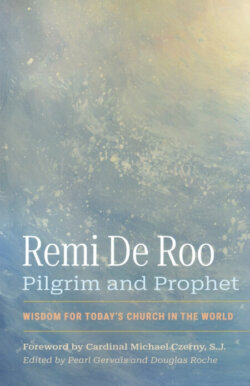Excerpts from Remi De Roo “Pilgrim and Prophet”
Pearl Gervais and Douglas Roche
Volume 39 Issue 7, 8, & 9 | Posted: October 22, 2024

CARE FOR THE EARTH, OUR COMMON HOME
The universe carries the imprint of God, and it is our task to show how God is revealed in creation.
The Creator of the universe whom you and I worship has blessed us in many ways. I give thanks to the Creator today for the beauty of the prairies, the symphony of the wind in the fields of grain, the immensity of the blue skies, the glory of the clouds sailing above us, the warmth of the sun, the mystery of night, which reveals the myriad stars and beckons us to explore the universe of out space.
People who live close to nature easily become prayerful and even contemplative people. They can read in nature as in a favourite book the signs of the times of which the bible speaks. Faith and science, far from being opposed, complement one another in vital inter-relationships. Genuine agriculture invites us to develop a spirituality of the land as giving, as nurturing, as leading us to authentic wisdom for our own fulfillment and the integral development of generations to come.
— “Agri-culture, Agri-business or Agri-power?” National Farmers’ Union Convention, Saskatoon, Saskatchewan, December 2, 1985
≈≈≈≈
We are learning to appreciate Aboriginal views of the nature of human beings, the mysteries of the universe, spiritual relationships to the land and corresponding values and institutions.
Churches and society are learning the land is Mother Earth herself. It is the source of life and culture and pertains to the realm of the divine. It is the common soil of social and spiritual experience, giving rise to the very values and institutions of society. Thus, the land itself and all it contains is to be revered, cared for and cultivated for the lasting benefit of the whole community.
— “Exploring the Canadian Experience,” Christian Life in Canada, Toronto, Ontario, Aug. 21, 1977.
≈≈≈≈
We are beginning to see ourselves as part of all creation, in relation with all things. In the Gospels, in the psalms, the parables, Jesus’s attitudes and actions reflect a view of creation in which God is the loving and gracious giver of all that is good. It is the vision of creation presented in the Judeo-Christian biblical story” human beings and all creatures reflect the image of God and share in God’s creative power. Human persons are meant to live in intimate relationship with God, with each other, and with all creation as the careful, reverent stewards of the earth.
— “New Paradigms for Empowerment and Equality,” Ontario English Catholic Teachers’ Association, April 8, 1988
≈≈≈≈
The “ultra humanity” that Teilhard de Chardin projected only as an evolutionary possibility, today’s scientists insist, is an evolutionary necessity. Everyone sees that death, destructin, and despair are widespread. If we continue our violent exploitation and desecration of the environment, we may be heading into chaos, to destruction and eventual annihilation. We have reached the point where we could destroy the whole enterprise.
— Even Greater Things, p.41
≈≈≈≈
Who can reverse the cumulative destruction that we humans are causing? At this point, environmentalists and Christian moralists converge in one reply. The onus is on us. The burden is ours to bear. We are the stewards of creation, but we must abandon any idea that we can render an account of our stewardship through the exercise of power and control. As British economist Barbara Ward used to say, either we learn to love – love the universe and love one another – or we will die. This ties in with Brian Swimme’s view that the touchstone of morality is the development of the universe according to its divine purpose. Anything we do which destroys the environment and prevents it from developing in the glory of God is evil. Everything we do as humans to help the universe achieve its divine purpose is good,
— Even Greater Things, p.41
Pearl Gervais and Douglas Roche
